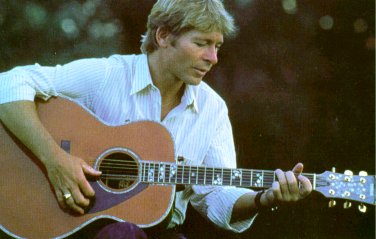John Denver (December 31, 1943 - October 12, 1997)
 According to High Times magazine (March 1976), singer/songwriter John Denver told reporters at a press conference in Sydney, Australia, "Sure I enjoy hashish. I use it. I have a lot of fun with the stuff. But it's like alcohol. You shouldn't let it get out of hand." According to HT, "One shocked religious leader in Arizona called for Denver to be deported immediately. A newspaper columnist described the candid quote as '. . . like Billy Graham announcing he was going into Blue Movies'."
According to High Times magazine (March 1976), singer/songwriter John Denver told reporters at a press conference in Sydney, Australia, "Sure I enjoy hashish. I use it. I have a lot of fun with the stuff. But it's like alcohol. You shouldn't let it get out of hand." According to HT, "One shocked religious leader in Arizona called for Denver to be deported immediately. A newspaper columnist described the candid quote as '. . . like Billy Graham announcing he was going into Blue Movies'."
In addition to his own numerous hits like "Rocky Mountain High," Denver wrote "Leavin' on a Jet Plane" for Peter, Paul and Mary and appeared as Jerry Landers, the assistant grocery manager picked by God (played by George Burns) to deliver His message in the movie "Oh, God!" (1977). "I picked a good man, a very good man," was God's explanation for picking such a lowly messenger, and looking at Denver's beautific face it was easy to see he was right. In the movie, Denver's character emerges victorious in a court case involving the slander of a corrupt evangelist.
In real life, Denver died on October 12, 1997 when a plane he was piloting crashed in the Pacific Ocean near Monterey, California. According to the Washington Post, the key factor in Denver's crash seems to have been the decision by the plane's builder to place a fuel valve switch in a hard-to-get-at location behind the pilot. Denver's aircraft was the only Long-EZ ever built with the fuel valve in that location, and his small stature made it especially hard for him to reach it. The plane was new to Denver; he had just bought it from its second owner.
Denver toured the USSR in 1986 to give the first performances by an American artist there since the cold war began, and returned there in 1987 to do a benefit concert for the victims of Chernobyl. He was also the first artist from the West to do a multi-city tour of Mainland China (where his songs were well known) in 1992. Denver served on the Presidential commission on World & Domestic Hunger under President Carter and was given the Presidential "World Without Hunger Award" by President Reagan. In addition to serving on the Boards of Directors of The Cousteau Society, The National Space Institute and others, he co-founded The Windstar Foundation and Plant-It 2020, which has lead to the planting of one million indigenous trees since 1992.
The chorus of Denver's song "Poems, Prayers, And Promises" talks about resting by a lit fireplace "while all my friends and my old lady sit and pass a pipe around," and he describes smoking in that manner with his wife Annie and friends in Take Me Home - An Autobiography. "Annie's Song," written for his wife, has been sung at countless weddings and his "Take Me Home, Country Roads" is the second state song of West Virginia.
"Rocky Mountain High" was made one of two official state songs on March 12, 2007 by the Colorado General Assembly. The Rocky Mountain News wrote, "In the House, Rep. Debbie Stafford, R-Aurora, unsuccessfully tried to amend the resolution to clarify that Rocky Mountain High 'reflects Colorado's high elevation and in no way reflects or encourages any drug abuse.' This caused Rep. Andy Kerr, D-Lakewood, to joke, 'But it's a joint resolution.'"
"Exploring inner space had become as important to my generation as the exploration of outer space," Denver's wrote in his autobiography Take Me Home, where he admits to getting stoned in Aspen in 1972 with a gentleman named "Crow" with whom he also tripped. Denver wrote that the line from "Rocky Mountain High": "And they say he got crazy once, and he tried to touch the sun," came from that episode, but wasn't just about tripping. It was also about exhilaration, freedom and mortality. The popularity of "Rocky Mountain High" made Denver a "superstar," he wrote.
Colorado was the first state to legalize adult marijuana sales on January 1, 2014 - one day after Denver's 70th birthday. As folks from all over the country lined up to purchase their first legal marijuana ever in Denver stores, it was recalled that the city was the site of the first US arrest for marijuana after it was effectively made illegal across the country in 1937.